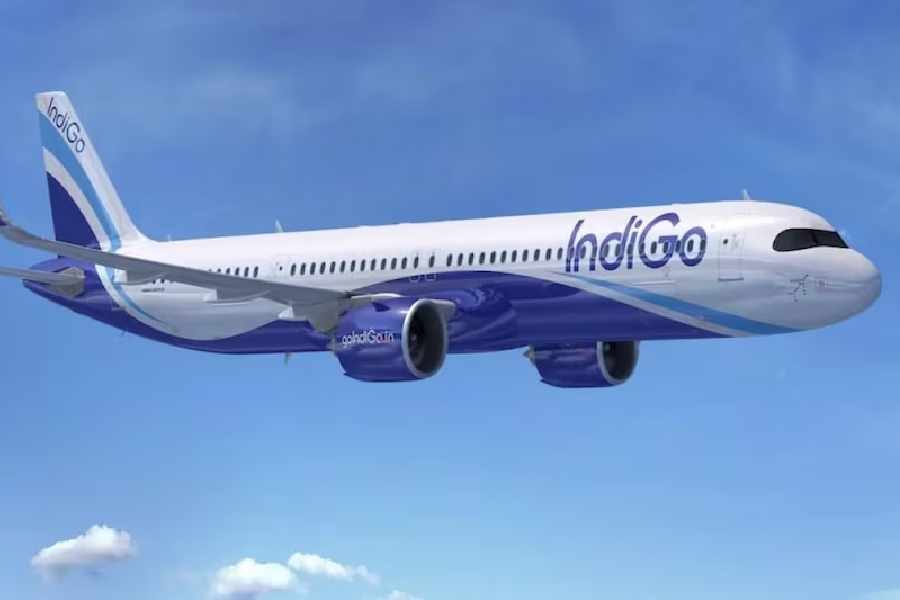Aviation regulator DGCA on Thursday said Pratt & Whitney will issue a service bulletin regarding the second phase of recall of its engines in two months, and most of the engine removals are expected in the first quarter of 2024.
The Directorate General of Civil Aviation (DGCA) has also taken up with Pratt & Whitney (P&W) the three incidents of IndiGo planes suffering engine issues in recent weeks and had sought urgent intervention, according to a note.
Out of the three incidents of In-Flight Shut Down (IFSD), two happened on August 28, involving Madurai-Mumbai and Kolkata-Bengaluru flights that were operated with A321 neo planes. The third one, involving the Amritsar-Delhi flight, operated with an A320 neo aircraft, happened on September 3.
IndiGo's fleet of A320 planes is powered by P&W engines and a total of 11 engines were impacted due to the high-pressure turbine (HPT) hub issues that were flagged by the engine maker in July. Globally, a total of 200 engines were to be recalled due to the HPT hub issues, which could only be detected with an Angular Ultra Sonic Inspection (AUSI) at the shop level.
In the first phase, the impacted engines were required to be removed before September 15 for the AUSI in a shop.
In the note, DGCA said that 11 engines of the IndiGo fleet were impacted and out of these, 6 were part of the current P&W AOG (Aircraft on Ground) and only 5 were operating engines, which were removed before September 15.
"On September 11, P&W indicated that the phase 2 recall is being reviewed by P&W, which will require the removal of up to 600 engines between 2023 and 2026, with most of the removals in Q1 of 2024. P&W will issue a Service Bulletin in the next 60 days with the fleet management action plan," as per the note.
In the wake of the three incidents on August 29 and September 3, the regulator took up the matter with P&W and demanded its "urgent intervention of the highest level for suitable mitigation".
"P&W was also advised to identify the probable cause of the HPT blade damage along with the additional inspection(s)/ task(s), recommended by P&W, if any, to detect the deterioration at an early stage to be intimated along with the data of such failures globally and the mitigation measures recommended by P&W to be shared with DGCA," as per the note.
On August 29, there was a commanded IFSD in IndiGo's A321 neo aircraft that was operating from Madurai to Mumbai wherein the crew observed high vibration and low oil pressure on an engine, followed by an engine stall.
"Upon landing at Mumbai airport, metallic chips were found on the oil chip detector," DGCA said.
On the same day, the airline's A321 neo plane operating from Kolkata to Bengaluru was involved in a commanded IFSD, wherein similar observations were made by the crew on an engine and the aircraft landed back at Kolkata. In that instance also, metallic chips were found on the oil chip detector.
Later, on September 3, there was a similar incident with IndiGo's A320 Neo aircraft that was flying from Amritsar to Delhi. In that case, low oil pressure was observed by the crew on an engine and the aircraft landed back at Amritsar.
External oil leak was observed on the affected engine but no vibration or oil chip was reported, DGCA said.
Following the incidents, a Boroscopic Inspection (BSI) of the engines concerned was done by IndiGo, wherein damage to the Stage 1 blades of the HPT was observed on the engines involved in the incidents on August 29. However, no anomaly was observed in the BSI of the affected engine in the incident on September 3.
According to DGCA, the engines involved in the three incidents had done more than 3,000 hours since the last shop visit.
Subsequently, the regulator directed IndiGo to identify and conduct BSI of the engines installed on A321 aircraft, which had done more than 3,000 hours since the last shop visit.
Three engines were identified but no abnormality was observed after BSI.
Further, as a precaution, DGCA asked IndiGo to undertake BSI for engines installed on A321 aircraft that have done more than 2,500 hours since the last shop visit.
Accordingly, five engines were identified but BSI did not find any abnormality in those engines.
Except for the headline, this story has not been edited by The Telegraph Online staff and has been published from a syndicated feed.











